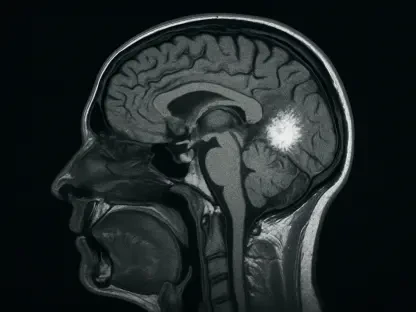In an era where healthcare professionals face mounting pressures to deliver swift and accurate care amidst rising patient volumes and complex cases, the integration of artificial intelligence (AI) into clinical decision-making has emerged as a game-changer. Wolters Kluwer Health has taken a bold step forward with the launch of UpToDate Expert AI, an innovative enhancement of its widely trusted UpToDate clinical decision support platform. This cutting-edge tool leverages generative AI to provide clinicians with rapid, reliable answers to intricate medical queries, directly addressing the critical demands of high-stakes environments like emergency rooms. With over 3 million users already relying on UpToDate, this advancement builds on a 30-year legacy of trust and precision. What makes this AI solution stand out in a crowded field, and how does it tackle the inherent challenges of applying such technology in medicine? This exploration delves into the transformative potential of UpToDate Expert AI and its impact on modern healthcare workflows.
Building Trust in AI-Driven Medical Tools
The cornerstone of UpToDate Expert AI lies in its commitment to reliability, a vital factor in an industry where errors can have life-altering consequences. Unlike many generative AI platforms that source data from unverified corners of the internet, risking inaccurate or fabricated outputs often termed “hallucinations,” this tool operates within a tightly controlled framework. It exclusively draws from UpToDate’s extensive repository of expert-authored, peer-reviewed content, meticulously curated by over 7,600 clinicians and refined by in-house physician editors. This closed-system design ensures that every piece of information provided to healthcare professionals is rooted in evidence-based knowledge, significantly reducing the likelihood of mistakes that could lead to misdiagnoses or improper treatments. By prioritizing trustworthiness, the tool sets a high standard for AI applications in clinical settings, offering a safeguard against the pitfalls that have plagued less rigorous systems.
Another dimension of trust with UpToDate Expert AI is its transparency, which further solidifies clinician confidence. The tool not only delivers answers but also provides clear access to the underlying rationale and sources behind each recommendation. This feature addresses a common concern in AI adoption: the opacity of decision-making processes in many automated systems. Clinicians can review the evidence and context supporting the AI’s suggestions, ensuring that their judgment remains central to patient care. This approach mitigates the risk of blind reliance on technology, fostering a partnership between human expertise and digital innovation. As healthcare continues to grapple with integrating advanced tools, such transparency becomes a benchmark for ensuring that AI enhances rather than undermines the critical thinking essential to medical practice.
Accelerating Decisions in High-Pressure Environments
Time is a precious commodity in healthcare, particularly in settings where every second counts, such as emergency departments. UpToDate Expert AI rises to this challenge by functioning as an intuitive, chatbot-style interface that delivers precise answers to complex clinical questions with remarkable speed. Early feedback from users like emergency medicine physician Judith Wolfe, M.D., highlights the tool’s ability to seamlessly integrate with electronic health record systems like Epic, providing near-instantaneous insights even in the most chaotic scenarios. This rapid response capability allows clinicians to focus on patient interaction rather than sifting through extensive resources, directly addressing the inefficiencies that often hinder timely care. In environments where delays can impact outcomes, such efficiency represents a significant leap forward in supporting frontline medical staff.
Beyond immediate response times, the efficiency of UpToDate Expert AI extends to streamlining broader clinical workflows. The tool’s design minimizes the cognitive load on healthcare providers by presenting information in a concise, actionable format, tailored to the urgent needs of the moment. This is particularly valuable in scenarios involving rare conditions or unfamiliar protocols, where quick access to trusted guidance can make a critical difference. By reducing the time spent on research, the AI empowers clinicians to allocate more attention to direct patient care, enhancing both the quality and speed of service delivery. As healthcare systems worldwide strive to manage increasing demands with limited resources, innovations like this offer a practical solution to optimize performance without compromising on accuracy or safety.
Competing in a Dynamic Healthcare AI Landscape
The arena of AI-powered clinical decision support is brimming with activity, as numerous companies vie to redefine how medical knowledge is accessed and applied. Competitors such as OpenEvidence and Pathway have already staked their claims with robust tools, backed by substantial funding and strategic acquisitions that underscore the market’s enthusiasm for AI solutions. However, UpToDate Expert AI enters this competitive space with a distinct advantage rooted in Wolters Kluwer’s long-standing reputation and extensive reach. With a user base exceeding 3 million clinicians and deep integration into existing clinical systems, the platform benefits from an established trust that newer entrants must work harder to achieve. This entrenched position provides a powerful distribution network, ensuring the tool’s accessibility to a wide array of healthcare providers.
Moreover, the competitive edge of UpToDate Expert AI is not merely about market presence but also about the depth of its ecosystem. The tool capitalizes on decades of refined content and user feedback to deliver a product that resonates with the real-world needs of clinicians. While newer players may innovate quickly, they often lack the comprehensive data and historical credibility that Wolters Kluwer brings to the table. This legacy allows the company to offer a solution that is not just technologically advanced but also deeply aligned with the practical demands of medical practice. As the healthcare AI market continues to evolve with rapid investments and innovations, the balance between established trust and cutting-edge technology will likely determine which tools gain lasting traction among professionals.
Addressing the Perils of AI in Clinical Settings
While the promise of AI in healthcare is undeniable, the associated risks cannot be overlooked, and Wolters Kluwer has adopted a prudent stance to navigate these challenges. Concerns such as AI-generated inaccuracies, over-dependence on automated outputs, and the potential erosion of clinical skills—often referred to as “deskilling”—pose significant threats to patient safety. Internal evaluations of other AI systems revealed troubling errors, including recommendations for unnecessary procedures and unsafe medication adjustments. In response, UpToDate Expert AI underwent a rigorous two-year development phase, incorporating extensive beta testing with select users to refine its accuracy and reliability. This deliberate process underscores a commitment to ensuring that the technology serves as a dependable aid rather than a source of costly mistakes.
Equally important is the focus on mitigating behavioral risks among clinicians using AI tools. Phenomena like “automaticity,” where providers might act on AI suggestions without sufficient scrutiny, are addressed through the tool’s emphasis on explainability. Every output is accompanied by accessible reasoning and source information, encouraging users to engage critically with the provided data. This design aims to preserve the clinician’s role as the ultimate decision-maker, preventing the technology from overshadowing human judgment. By tackling both technical and human factors, UpToDate Expert AI sets a precedent for how AI can be responsibly integrated into medicine, ensuring that innovation does not come at the expense of patient well-being or professional expertise.
Supporting Clinical Thought with Intuitive Design
UpToDate Expert AI goes beyond merely supplying answers; it is engineered to bolster the intricate process of clinical reasoning. The tool provides context-rich responses, allowing clinicians to understand the ‘why’ behind each recommendation through single-click access to supporting evidence and assumptions. This thoughtful design, born from collaboration among physicians, engineers, and user experience specialists, mirrors the analytical approach of experienced medical professionals. Early adopters have lauded its alignment with real-world clinical demands, noting how it facilitates informed decision-making rather than dictating actions. Such a focus on usability ensures that the technology enhances rather than replaces the nuanced judgment required in patient care.
Additionally, the intuitive nature of UpToDate Expert AI fosters a seamless interaction that fits naturally into busy clinical routines. By presenting information in a way that complements how clinicians think and work, the tool reduces friction and enhances adoption among diverse medical teams. This user-centric approach not only builds trust in the technology but also ensures that it serves as a practical extension of a clinician’s expertise. Whether addressing rare conditions or routine queries, the system supports a deeper understanding of each case, empowering healthcare providers to deliver tailored, high-quality care. As AI becomes more embedded in medicine, designs that prioritize human cognition alongside technological efficiency will be crucial for widespread acceptance and impact.
Shaping the Future of Healthcare Through Innovation
The introduction of UpToDate Expert AI reflects a broader movement within healthcare to harness generative AI for managing escalating workloads and increasingly complex patient scenarios. Industry consensus holds that while the potential of such technology is vast, its implementation must never compromise patient safety. Wolters Kluwer’s measured approach to development, in contrast to the accelerated pace of some competitors, highlights the ongoing tension between pushing boundaries and ensuring reliability. This balance will continue to define the trajectory of AI in medicine, as stakeholders grapple with how to innovate responsibly in a field where stakes are exceptionally high. Meanwhile, surging investments signal robust confidence in AI’s transformative capacity.
Looking ahead, the influence of tools like UpToDate Expert AI could redefine standards for clinical support systems, emphasizing the need for curated, dependable data over expansive but unverified sources. The focus now shifts to how such innovations can be scaled and adapted to diverse healthcare settings while maintaining rigorous validation. As the landscape evolves, collaboration between technology developers and medical professionals will be essential to address emerging challenges and refine AI applications. The path forward lies in continuous improvement and vigilance, ensuring that each advancement not only enhances efficiency but also upholds the fundamental priority of safeguarding patient outcomes.









